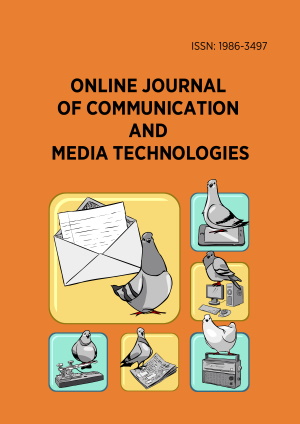Research Article
Child Media In Terms Of Child and Parent
More Detail
1 Anadolu University, Turkey* Corresponding Author
Online Journal of Communication and Media Technologies, 6(December 2016 - Special Issue), 2016, 1-14, https://doi.org/10.30935/ojcmt/5639
OPEN ACCESS 1624 Views 1103 Downloads
ABSTRACT
Child is the little citizen who is accepted under age (Yörükoğlu, 2007, s.13). According to Greenberg, many children are the audience who cannot differentiate between whether the programs they watch are suitable for them or not (Ertürk, Gül, 2006,s.24). 20th century called the Children Century changed the fate of children by scientific findings and technological developments. Therefore, the relation between media and the children along with the responsibilities of parents have changed. Because the mass media is a part of life, it is one of the important factors binding the common communication areas of children as with adults’. Children not only have nutritional and sleeping needs but also they have intellectual needs (Dadson, 1990, s.36-38). The emergence of digital broadcasting and the appearance of TV channels aimed at various hobbies and tastes paved the way for some TV channels to broadcast towards children ( and babyhood period ). In these channels, norms, judgements gender roles and models according to the culture of society are usually repeated. Popular cultural products for consumption do not take into account the personal differences but they target common people. In this respect, as knowing the child well is crucial, a main responsibility faces the parents.
CITATION (APA)
Uygunkan, S. B. (2016). Child Media In Terms Of Child and Parent. Online Journal of Communication and Media Technologies, 6(December 2016 - Special Issue), 1-14. https://doi.org/10.30935/ojcmt/5639
REFERENCES
- Atay, Mesude. Çocukluk Döneminde Gelişim. 2. Basım. Ankara: Kök, 2007
- Can, Davut. Eğitimin Merkezi Ev Anne ve Babanın Rolü. İstanbul: Elit Kültür, 2010
- Çakır Vedat, Çakır Vesile. Televizyon Bağımlılığı, İstanbul: Literatürk, 2010
- Dodson, Fitzhugh. Çocuk Yaşken Eğilir. 2. Basım. İstanbul: Özgür, 1990.
- Doğan, İsmail. Akıllı Küçük. İstanbul: Sistem, 2000
- Eisenberg,Arlene., Murkoff, heidi E., Hathaway, Sandee E. Çocuğunuz Büyürken Sizi Neler Bekler.8. Basım. İstanbul: Epsilon.2005
- Ersoy, Özlem., Avcı, Neslihan., Turla, Ayşe., Çocuklar İçin Erken Uyarıcı Çevre. İstanbul: Morpa, 2008.
- Ertürk, Yıldız Dilek., Gül, Ayşen Akkor. Çocuğunuzu Televizyona Teslim Etmeyin. Ankara. Nobel, 2006
- Jensen, Klaus Bruhn., Rosengren, Karl Erik., Morley, David., Hoijer, Brigitta., Sender, Katherine., Biltereyst, Daniel., Hall, Stuart., Roscoe, Jame., Marshall, Harriette., Gleeson, Kate., Seaman, William R. Derleyen: Şahinde Yavuz. Medya ve İzleyici Bitmeyen Tartışma, Ankara: Vadi, 2005
- Odabaşı, Ferhan., Kabakçı, Işıl., Çoklar, Ahmet N..İnternet, Çocuk ve Aile. Ankara: Nobel, 2007
- Özbey, Çetin. Çocuk Eğitiminde Yapılan Hatalar. İstanbul: İnkılap, 2008
- Şirin, Mustafa Ruhi. Çocuk Hakları ve Medya. İstanbul: Çocuk Hakları Yayınları, 2011
- Taştan, Kenan. Şimdiki Aklım Olsaydı. İstanbul: Yeni Asya, 2011
- Tokgöz, Oya. Televizyon Reklamlarının Anne Çocuk İkilisine Etkileri. Ankara: Ankara Üniversitesi Siyasal Bilgiler Fakültesi Yayınları, 1982
- Tosyalı, Filiz. Annem Babam Yaşam Koçum. İstanbul: Sistem, 2010
- Tönel, Adnan. Uzaktan Kumandalı Çocuklar. İstanbul: Hayykitap, 2007
- Yörükoğlu, Atalay. Değişen Toplumda Aile ve Çocuk. İstanbul: Özgür, 2007

 The articles published in this journal are licensed under the CC-BY Creative Commons Attribution International License.
The articles published in this journal are licensed under the CC-BY Creative Commons Attribution International License.